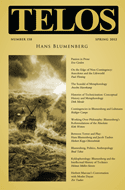Paul Fleming’s “On the Edge of Non-Contingency: Anecdotes and the Lifeworld” appears in Telos 158 (Spring 2012). Read the full version online at the TELOS Online website, or purchase a print copy of the issue here.
 This essay examines Hans Blumenberg’s reorientation of metaphorology toward the lifeworld and the resulting expansion of his project into a “theory of nonconceptuality.” I argue for an intimate relation in Blumenberg between the lifeworld as a “universe of self-evidence” and the anecdote as a genre in which “no detail is capricious.” Blumenberg’s increasing interest in anecdotal narration and its explication is central to his reorientation of nonconceptuality, since both—the lifeworld and the anecdote—converge at the limit of contingent thought. Through a close reading of Blumenberg’s extensive engagement with the multifarious rewritings of the Thales-Thracian Maid anecdote throughout the history of philosophy, the essay hones in on the tension between non-contingency (lifeworld) and contingency (theory). In explicating the anecdote’s re-narrations, Blumenberg unfolds a dual tension: first, between the individual anecdote’s apparent non-contingent narrative economy and its radical variability over time so as to continually re-write and re-occupy the story of theory’s ‘beginning’; and, second, between thinking and non-thinking, since Blumenberg’s project of nonconceptuality inscribes an essential element of non-thinking within theory. This is the lifeworld for him, which cannot be thought away.
This essay examines Hans Blumenberg’s reorientation of metaphorology toward the lifeworld and the resulting expansion of his project into a “theory of nonconceptuality.” I argue for an intimate relation in Blumenberg between the lifeworld as a “universe of self-evidence” and the anecdote as a genre in which “no detail is capricious.” Blumenberg’s increasing interest in anecdotal narration and its explication is central to his reorientation of nonconceptuality, since both—the lifeworld and the anecdote—converge at the limit of contingent thought. Through a close reading of Blumenberg’s extensive engagement with the multifarious rewritings of the Thales-Thracian Maid anecdote throughout the history of philosophy, the essay hones in on the tension between non-contingency (lifeworld) and contingency (theory). In explicating the anecdote’s re-narrations, Blumenberg unfolds a dual tension: first, between the individual anecdote’s apparent non-contingent narrative economy and its radical variability over time so as to continually re-write and re-occupy the story of theory’s ‘beginning’; and, second, between thinking and non-thinking, since Blumenberg’s project of nonconceptuality inscribes an essential element of non-thinking within theory. This is the lifeworld for him, which cannot be thought away.







